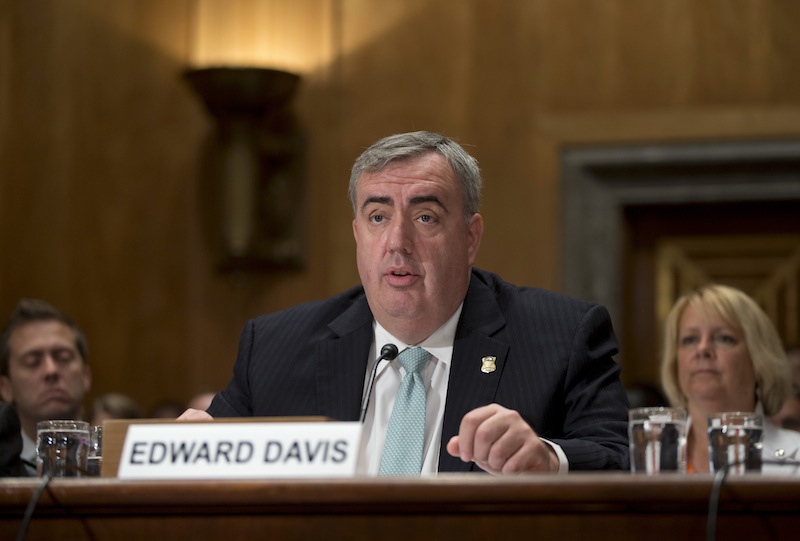WASHINGTON — Boston’s police commissioner complained to a Senate panel Wednesday that the Justice Department failed to share information on terrorism threats with local officials before the Boston Marathon bombing. A House committee chairman criticized the FBI for declining to appear at a House hearing on the same subject.
“There is a gap with information sharing at a higher level while there are still opportunities to intervene in the planning of these terrorist events,” Police Commissioner Edward F. Davis III told the Senate Homeland Security and Governmental Affairs Committee.
He said information sharing should be made a mission statement requirement for local Justice Department task forces on terrorism organized by the FBI.
Three people were killed and more than 260 injured by twin blasts near the finish line of the Boston Marathon on April 15.
Now, as then, law enforcement officials say information about threats known by one agency sometimes doesn’t make it to another agency that may be in a position to prevent bloodshed. Davis, for example, repeated that his police department was unaware of information the Justice Department had prior to the bombings about Tamerlan Tsarnaev’s six-month trip to Chechnya last year.
Tsarnaev was killed in a shootout with police days after the bombing. Since then officials have tried to assess whether he was influenced by Islamist radicals during the trip. His brother, Dzhokhar, pleaded not guilty Wednesday to a 30-count indictment in federal court in Boston.
Local police should know about residents who could pose a national security threat, Davis said, a sentiment echoed by several lawmakers.
Across the Capitol, the FBI came in for more criticism. Rep. Michael McCaul, R-Texas, complained that the agency declined to testify at a hearing before the House Homeland Security Committee he chairs.
“It is this committee’s responsibility to find out how we did not see it coming,” McCaul said. “We are going to find out what happened, what went wrong and how to fix it.”
FBI spokesman Paul Bresson said later that the agency had briefed the House committee on several occasions and would continue to do so, but that it also has a responsibility to “protect the integrity of the judicial process” in which the sole surviving suspect is being prosecuted.
“This involves ensuring both the government’s ability to conduct a successful prosecution as well as protecting the rights of all parties involved, including the victims, their families and the defendant, who as it turns out, has a court appearance on the same day as this hearing,” Bresson said.
Davis said the FBI was helpful after the bombings and pointed out that much has been done to improve information sharing and communications. But he said the “memorandum of understanding” that organizes the joint task forces should include a requirement to brief local law enforcement regularly on threats.
Michael Leiter, former head of the National Counterterrorism Center, agreed that task force rules make sharing information, some possibly classified, difficult.
Experts testifying at the Senate hearing said Boston’s response to the attack actually was exemplary, in part because the city years ago built relationships and forged disaster plans among law enforcement, medical personnel and other responders. They said Congress should support similar efforts in other cities large and small.
“People are on a first name basis” in Boston’s responder community, Richard Serino, deputy administrator for the Federal Emergency Management Agency, told senators. “The medical community has been linked in with public safety for years, not just since 2001.”
Arthur L. Kellermann, a doctor and analyst for the RAND Corporation, said Boston’s personnel had studied how their counterparts in London, Madrid and elsewhere had handled terrorist attacks.
“Boston’s responders were both lucky and good, that’s why so many victims survived,” Kellermann said. “They were prepared to do a great job…. Everyone knew what to do. That’s how disaster plans work.”
Send questions/comments to the editors.



Success. Please wait for the page to reload. If the page does not reload within 5 seconds, please refresh the page.
Enter your email and password to access comments.
Hi, to comment on stories you must . This profile is in addition to your subscription and website login.
Already have a commenting profile? .
Invalid username/password.
Please check your email to confirm and complete your registration.
Only subscribers are eligible to post comments. Please subscribe or login first for digital access. Here’s why.
Use the form below to reset your password. When you've submitted your account email, we will send an email with a reset code.